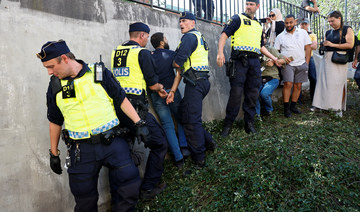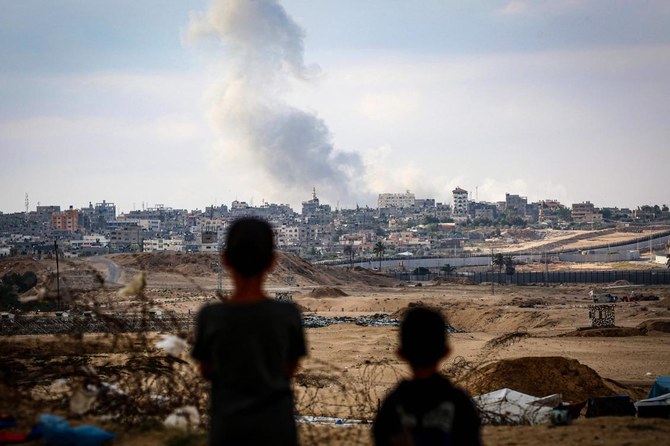DUBAI: Muslims around the world have joined Saudi Arabia in condemning the burning of a copy of the Qur’an by an Iraqi national outside Stockholm’s largest mosque on Wednesday.
Under a heavy police presence, Salwan Momika, a 37-year-old who fled to Sweden several years ago, on Wednesday stomped on the Qur’an before setting several pages alight in front of the mosque in the Sweedish capital.
Police had granted him a permit for the protest in line with free-speech protections, but said later it had opened an investigation into the Qur’an burning which sparked anger across the Muslim world.
It is not the first time such an act has happened in Sweeden.
In January, a Swedish-Danish right-wing extremist burned a copy of the Qur’an near the Turkish embassy in Stockholm, also triggering outrage in the Muslim world.
Swedish Prime Minister Ulf Kristersson said Momika’s protest was “legal but not appropriate,” and it was up to the police to permit it or not.
The incident occurred as Muslims around the world marked the Eid al-Adha holiday.
The Iraqi government in a statement issued late Wednesday strongly condemned “the repeated acts of burning copies of the holy Qur’an by individuals with extremist and disturbed minds.”
“These acts demonstrate a hateful and aggressive spirit that goes against the principles of freedom of expression,” it said.
“They are not only racist but also promote violence and hatred.”
“These irresponsible actions, in direct conflict with the values of respect for diversity and the beliefs of others, are unequivocally condemned.”
The Iraqi Ministry of Foreign Affairs summoned the Swedish Ambassador to Baghdad, the ministry said in a statement on Thursday.
The ministry condemns “the Swedish government’s permission for extremists to burn a copy of the Holy Qur’an,” the statement said.
The Organization of Islamic Cooperation said it would convene an emergency open meeting for the Executive Committee next week in Jeddah to discuss the consequences of the incident, under an invitation from Saudi Arabia, the president of the Islamic Summit.
The meeting next week is scheduled to discuss the measures to be taken against the heinous act and to adapt a collective position on the necessary course of action.
The US said it condemned the burning of the Qur’an, adding it believed the demonstration created “an environment of fear” that effectively curbs the ability of Muslims to practice their religion freely.
Speaking at a daily press briefing, State Department spokesperson Matt Miller said: “We believe the demonstration created an environment of fear that will impact the ability of Muslims and members of other religious minority groups from freely exercising their right to freedom of religion or belief in Sweden.”
The UAE also summoned the Swedish ambassador on Thursday to protest against the burning of the holy book, the UAE foreign ministry said in a statement.
Jordan summoned Sweden's ambassador in Amman on Thursday, said it considered the act as an “incitement and racism.”
The Foreign Ministry said burning the Holy Qur’an was an act of “dangerous hate and a manifestation of Islamophobia” that incites violence.
The Ministry’s statement said burning the Quran “cannot” be considered a form of freedom of expression, adding there is a “need to stop irresponsible behavior and actions.”
The Ministry said hate speech and action must be countered and there must be promotion for a culture of peace and acceptance.
And Kuwait’s Ministry of Foreign Affairs said the burning of the Quran offended Muslims around the globe, adding that people needed to promote the values of tolerance and coexistence.
“This serious provocative move offends Muslims around the world,” the ministry said in a statement.
“The state of Kuwait reminds the international community and all countries concerned of their responsibility for acting against hate and religious extremism, and stopping the hostile acts that target the Muslim’s sanctities.”
“Perpetrators of such hostile acts should be brought to book and prevented from using the principle of freedoms as a ploy to justify hostility against Islam or any holy faith.”
Iran joined in the condemnation on Thursday, calling the act “provocative, ill-considered and unacceptable.”
“The government and people of the Islamic Republic of Iran... do not tolerate such an insult and strongly condemn it,” said foreign ministry spokesperson Nasser Kanani.
“The Swedish government is expected to seriously consider the principle of responsibility and accountability in this regard, while preventing the repetition of insulting the holy sanctities,” he added.
Morocco also condemned the Koran burning and recalled its ambassador to Stockholm late Wednesday.
“This new offensive and irresponsible act disregards the feelings of more than a billion Muslims, at this sacred time of the great pilgrimage to Makkah and the blessed feast of Eid al-Adha,” it said in a statement.
“Faced with these repeated provocations, committed under the complacent gaze of the Swedish government,” Morocco summoned Sweden’s charge d’affaires in Rabat and recalled its ambassador, it added.
In January, a Swedish-Danish right-wing extremist burned a copy of the Koran near the Turkish embassy in Stockholm, also triggering outrage in the Muslim world.
And the Muslim World League secretary-general, chairman of the Organization of Muslim Scholars, Sheikh Mohammed bin Abdulkarim Al-Issa denounced the act which he said was carried out under the protection of the police.
He said that while it happened “under the claim of practising freedom of expression,” in reality, it abused, “among many things, the true concept of freedom, which calls for respecting and not provoking others under any pretext.”
Issa said such acts fueled hatred, provoked religious sentiments, and served only the agendas of extremism.Turkish Foreign Minister Hakan Fidan also condemned Momika’s protest as despicable.
“It is unacceptable to allow these anti-Islamic actions under the pretext of freedom of expression,” he said.
(With agencies)


























